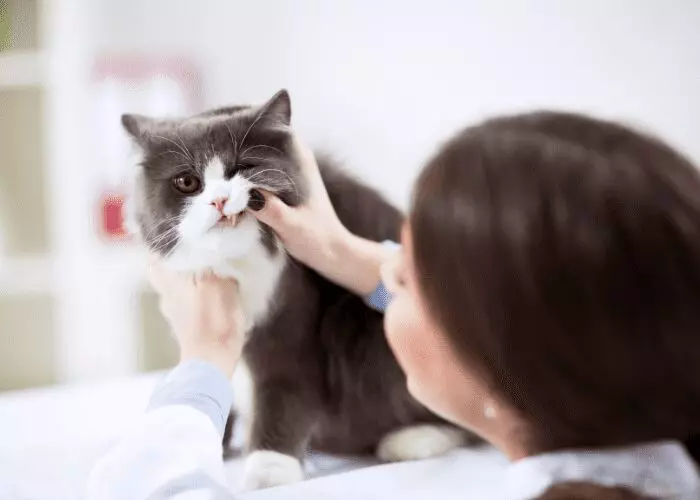When it comes to weight in cats, they should ideally stay the same weight once they have reached adulthood. A pound or two over their ideal weight isn’t great but isn’t terrible. However, if a cat starts dropping weight rather quickly, something could be wrong. Weight loss in cats can be a clear indication of certain diseases. Unfortunately, a lot of owners do not realize how much weight their kitty has lost until the cat’s body condition score is a valid concern.
Keep reading to learn what every cat owner needs to know about weight loss in cats…
Hyperthyroidism
When a cat loses weight quickly and the cat seems rather grumpy, it could mean that the thyroid gland is all out of whack causing hyperthyroidism. When the thyroid gland goes into overdrive and produces too much of the thyroid hormone, specifically the T4 hormone.
Hyperthyroidism is a common disease in cats that reach the middle age of around 10. Diagnosing is performed by a veterinarian taking a blood sample for analysis. The veterinarian might also be able to actually palpate the thyroid glands on the neck of the cat. By running a thyroid panel, the veterinarian will be able to conclude the diagnosis.
Treatment is easy by medication once or twice a day depending on the level shown in the bloodwork. Many cats live their lives for years and years after being diagnosed. But, it is super important to give the medication exactly as directed and bring the cat in for bloodwork regularly. Sometimes the dose needs to be adjusted.
Kidney Disease
Another reason a cat may be losing weight, especially an older kitty, is due to the kidneys not being able to function properly. A cat with kidney disease will lose their appetite, vomit, and drink a ton of water. This is why it is important to have yearly checkups for those senior cats.
By checking a complete chemistry panel, a veterinarian will be able to evaluate the kidney enzymes, specifically creatine and BUN levels (blood urea nitrogen). If these levels are elevated significantly, then the cat’s kidneys are not filtering properly. If this is the case, the veterinarian may want to hospitalize the cat for IV fluids to help flush out the kidneys and speed up that filtering process. There is also food produced specifically for cats with kidney disease that contain lower amounts of protein.
Bad Teeth
Cats can also lose weight because it just hurts to eat because of bad dental hygiene. Periodontal disease, heavy tarter, and stomatitis can lead to anorexia and weight loss. It is important to keep up on those dental visits. You can read more about stomatitis here.
Stress and Anxiety
Cats are creatures of habit. They like their routines and become very upset when their routine is disturbed. Sometimes so upset about it, that they go on strike about eating. If all medical reasons have been ruled out about why a cat is losing weight, the reason very well could be psychological. Pheromones are a great way to help with stress without medicating.
Cancer
Weight loss, especially sudden weight loss can be a result of cancer as well. We never want to hear the “C” word, but sadly it happens. Cancer in the gastrointestinal tract can make cats lose weight quite quickly. Again, a veterinarian can diagnose by performing bloodwork, x-rays, ultrasound, and even a biopsy.
Keeping an eye on your cat’s weight is vital to their overall health. A two-pound drop can mean too much weight loss in an 8lb kitty. Keep your veterinarian updated when you feel like your cat has lost weight. Even feel free to keep a log of it at home.







